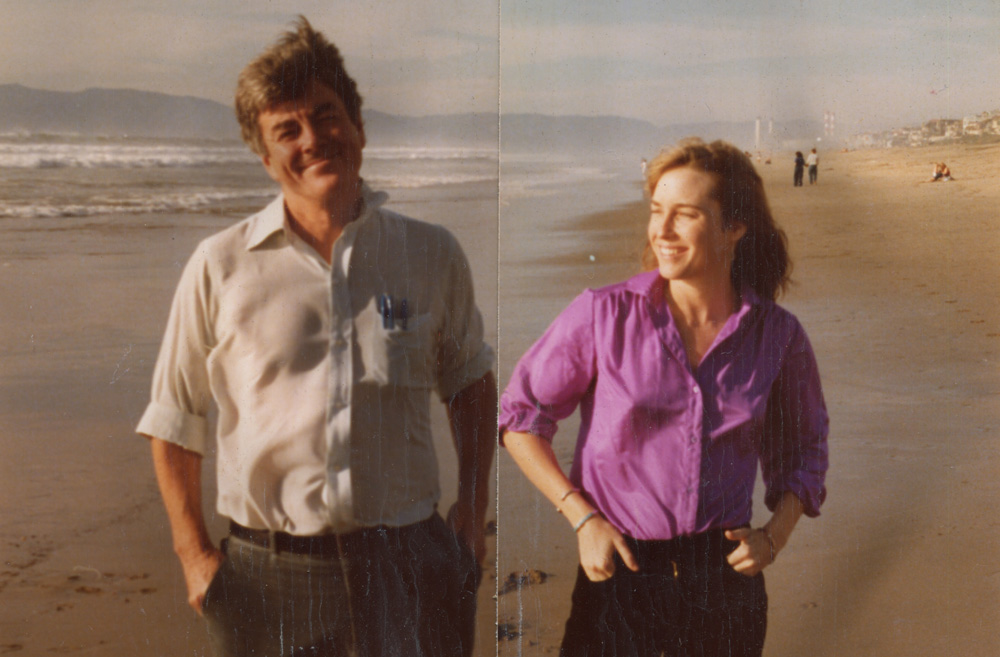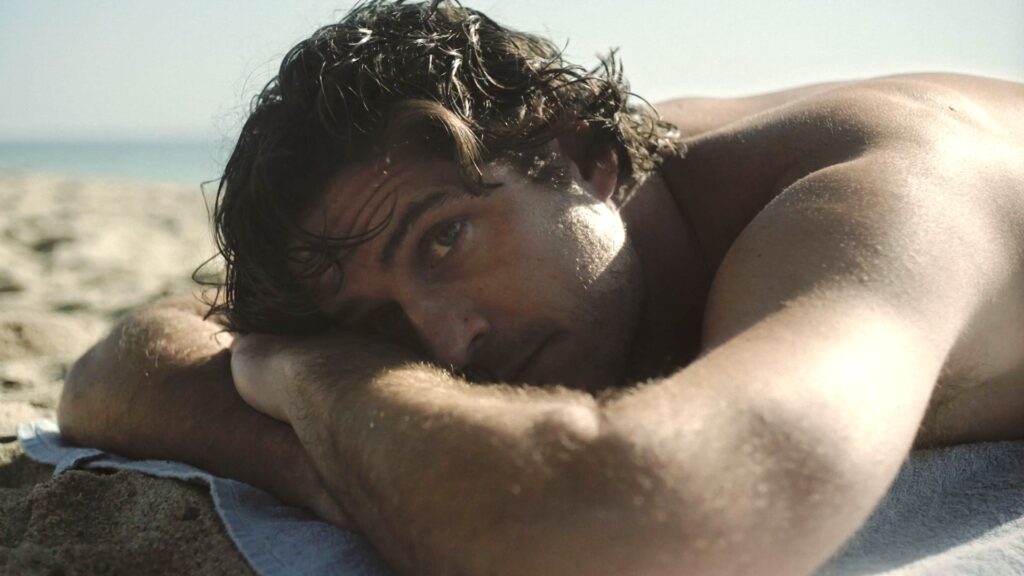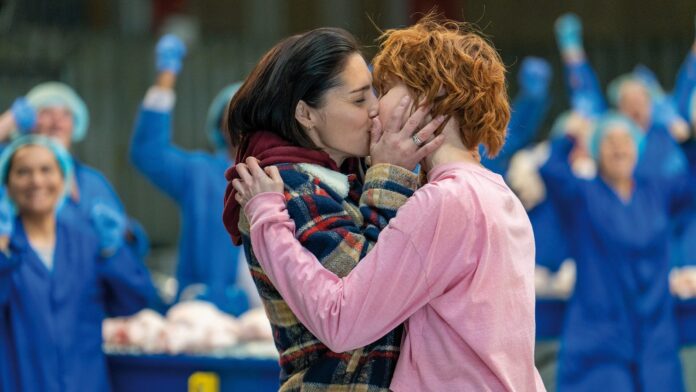>>We need you! Become a 48hills member today so we can continue our incredible local news + culture coverage. Just $20 a month helps sustain us. Join us here.
For its 48th annual big event, Frameline (Wed/19-June 30) is hitting the road—or at least utilizing venues within San Francisco (plus the New Parkway in Oakland) a bit farther-flung than usual. That’s primarily because its traditional home base of the Castro Theatre has shuttered for long-term renovations, though some other frequent exhibition choices have either closed or become unavailable as well. So in addition to the familiar secondary house of the Roxie on 16th Street, the 11 days of programming this year will encompass the Palace of Fine Arts in the Marina, the Vogue Theatre near the Presidio, and the Herbst auditorium at Civic Center.
That new wrinkle aside, you know what to expect from the former San Francisco International LGBTQ+ Film Festival—a vast array of features and shorts in all genres from around the world, all dealing with diverse aspects of queer experience. It kicks off this Wed/19 with a free evening Juneteenth Block Party on Castro St. itself that will feature live performances, then a screening of Lil Nas X: Long Live Montero, a part-concert, part-backstage portrait of the envelope-pushing pop sensation.
That commences a festival edition that is particularly rich in music-related content, with additional documentaries about superstar songwriter and former San Franciscan Linda Perry (Let It Die Here), who will also play live at a Frameline Pride Kickoff party at Oasis on Fri/28; a certain Berlin-based Canadian electroclash legend (Teaches of Peaches); Ani DiFranco (1-800-ON-HER-OWN); a late So. Cal. post-punk pioneer (The Life of Sean DeLear); musical and playwriting wit Noel Coward (Mad About the Boy); and the composer of hits for acts as diverse as Bonnie Raitt, Pet Shop Boys and Earth, Wind & Fire (The World According to Allee Willis).
The Palace and Herbst are where a number of higher-profile “Big Night” titles will be, including Alessandra Lacorazza’s recent Sundance prize winner In the Summers, Ray Yeung’s Hong Kong seriocomedy All Shall Be Well, globe-trotting male romance Duino, Anthony Schatteman’s Belgian teen romance Young Hearts, and Megan Park’s My Old Ass, in which Aubrey Plaza plays a 39-year-old bisexual woman who time-travels back to teach her 18-year-old self (Maisy Stella) some hard-earned wisdoms. Also encompassing a live tribute to producer-writer-actor (The Chi) Lena Waithe on Sat/29, the 14 programs at those two venues can be accessed as a block via purchasing a special “Palace Pass” available to Frameline members.d2
Proof that gay cinema no longer just means coming-out stories and romcoms is offered by ventures into a number of genres. There is supernatural drama (Egyptian The Judgment), black comedy (I Don’t Understand You), tongue-in-cheek horror (Australian Carnage for Christmas), the poker-faced kind (Haze), vampires (in shorts program “Fangs After Dark”) and even a stoner comedy (Extremely Unique Dynamic). There are works of a more experimental bent (Meanwhile, Underground Orange), and some vintage local adults-only raunch (writer-director-producer-editor-star Peter Berlin’s 1974 ode to self, That Boy, as well as a separate bill of SF-shot “Erotic City Shorts” stretching back to Curt McDowell’s 1980 Loads).
The sporting life is on display via a number of films, both fictive and non-, centered on female athletes: The Herricanes (about a short-lived 1970s women’s full-tackle pro football league), two feature narratives about volleyball (Sao Paolo-set Power Alley, Filipina high school romance Rookie), and a revival of 1985 bodybuilding survey Pumping Iron II: The Women. Life Is Not a Competition, But I’m Winning explores the controversial terrain of transpersons on the competitive playing field.
In addition to the titles already mentioned, deep digs from the archives include two very rare early 1970s exercises in high camp, the 1972 Warhol Factory-adjacent spoof Scarecrow in a Garden of Cucumbers and 1975’s sexually graphic, semi-Sapphic French neo-noir Don’t Change Hands. There’s also Merchant Ivory, a starry salute to the filmmaking and domestic duo best known for such lush literary costume dramas as Howard’s End and A Room With a View.
That still just scratches the surface of a sprawling schedule that draws stories from Taiwan (After the Snowmelt), Spain (Una pelicula barata), Georgia (Gondola), the Netherlands (Out), Brazil (Cidade; Campo), Pakistan (The Queen of My Dreams), Sweden (Crossing), Mexico (Demons at Dawn), and beyond. Local highlights include Sally!, about the late SF-based sci-fi author and activist Sally Gearhart, and Lady Like, which follows Brit-turned-Bay Area dancer Lady Camden aka Rex Wheeler on the demanding runway of RuPaul’s Drag Race.
Among films depicting non-binary lives in various ways is the dreamy rodeo fantasia National Anthem, the bathhouse-set Desire Lines, and Canadian-Philippines road trip tale Asog. If you prefer your travel to be of the armchair resort variety, there are documentaries about the past, present and future of two sandy gay meccas: Fire Island (A House Is Not a Disco) and the isle of Lesbos (Lesvia).
Here are a few recommended titles we were able to view in advance of Frameline48:
Any Other Way: The Jackie Shane Story
The most striking R&B talent you’ve probably never heard of, Shane was a Nashville “sissy” whose vocal prowess soon attracted Little Richard’s encouragement. Landing in 1959 Montreal, they became an instant sensation in a hopping, mob-controlled nightclub scene (there and soon in Toronto), as a commanding frontperson with an ultra-glam, gender-blurring persona far ahead of its time. Then s/he simply disappeared… for good. Michael Mabbott and Lucah Rosenberg-Lee’s documentary unravels that mystery, while providing a big taste of a singular voice you’ll want to hear more of.
This feminine equivalent to the bleak working-class UK inspirational likes of The Full Monty is set in a pokey Welsh town where Helen (Louise Brealy) labors at a poultry packing plant, and at home cares for an ailing mother-in-law (Sorcha Cusack) under the same roof as the awful husband (Celyn Jones) she’s separated from—as well as his obnoxious, much-younger, already-pregnant girlfriend (Emily Fairn).
This doormat existence brightens considerably with the return after 20 years of her former schoolmate-crush object Joanne (Annabel Scholey). Janis Pugh’s crowdpleasing drama gains novelty from being a sort of karaoke musical—characters periodically break into songs by artists as diverse as The Cascades, Neil Diamond, and Janis Ian.
Rose Troche’s groundbreaking contribution to the New Queer Cinema vogue of the early ’90s is a resourcefully no-budget, B&W ensemble romp of romantic entanglements (co-written by cast member Guinevere Turner) in Chicago’s youthful lesbian community. Its 30th anniversary is being marked with the screening of a new 4K restoration co-funded by Frameline.

“Love is love” has been a phrase used primarily to promote acceptance of non-heterosexual relationships. Yet it must also stretch to encompass the LTR between this documentary’s subjects, who’ve been together for nearly 40 years. The former US Representative from San Mateo, Paul aka “Pete” McCloskey is a Korean War vet and longtime Republican office holder who had four kids with his first wife. (Admittedly, he’s the kind of “conservative” who’d be rejected by the GOP now—he co-authored the Endangered Species Act, opposed the Vietnam and Iraq wars, and has been an outspoken critic of Israel’s policies.)
After their divorce he fell in with the much-younger Helen Hooper, who as a child had identified as male, and was just beginning to explore a sexuality that would lean towards the Sapphic side. “It wasn’t like we went into this with any idea of having a nontraditional marriage,” she says. But that’s what they got, and Alix Blair’s film is a surprisingly moving portrait of two strong personalities who have remained devoted to each other despite considerable differences.

On the run from a closeted existence in small-town Argentina, handsome but shy, sensitive Lourenco (Marco Pigossi) is nonetheless adrift in gay holiday haven Provincetown—where his American boyfriend left him stranded, and hasn’t been heard from since. Squeaking by without a work visa on odd jobs, staying in the mother-in-law cottage of a somewhat needy elder resident (Bill Irwin), he has no idea how to plot his future.
But the present starts looking a lot better when he meets the handsome Manhattanite Maurice (James Bland). Sexy yet not your stock frivolous gay romcom, Marco Calvani’s feature poignantly deals with depression, prejudice, and the difficulties of being a sensitive soul in a milieu of short-attention-spanned barflies.

The next time that annoying relative or high school alum tells you that homosexuality is clearly wrong (and/or a “choice”) because it “doesn’t exist in nature,” shove them in the direction of Drew Denny’s hour-long documentary, which begs to differ. Various experts in evolutionary biology, animal behavior et al. testify to the fact that (as one says) “Homosexual behavior in nature is one of the best-kept secrets. It’s absolutely everywhere.”
Species from bonobos to ducks to seahorses (whose males carry pregnancies to term) and clownfish (who can change their gender) underline that the wild world is a lot more diverse than you’ve likely been told—and there’s racy in-the-wild footage to prove it. Also of queerly scientific interest is Nelly Ben Hayoun-Stepanian’s Doppelgangers3, a freewheeling filmic essay which takes questions of gender and sexuality to the frontiers of space exploration.
Zacharias Mavroeidis’ Greek feature is a randy but soft-hearted comedy with a whole lot of nudity in which two gay men lounging on the beach recall their momentous summer of two years prior. At the time, hairy himbo Demos (Yorgos Tsiantoulas) had just broken up with his boyfriend of four years, while Nikitas (Andreas Labropoulos), the BFF and fellow film school graduate whose pining looks he ignores, was trying to come up with a viable project for a foreign producer. (Carmen, should you wonder, is a dog.) This very meta construct is frequently very funny, though the makers know their ace card lies in the eye-candy realm—you can tell because so many excuses are found to keep Tsiantoulas undressed.
Frameline48 runs June 19-29 at various San Francisco and Oakland venues. Many titles will also be available for streaming June 24-30 through the “Frameline at Home” program, though some will be limited via geo-blocking to California residents. For the festival’s full schedule of events and ticket info, go here.







